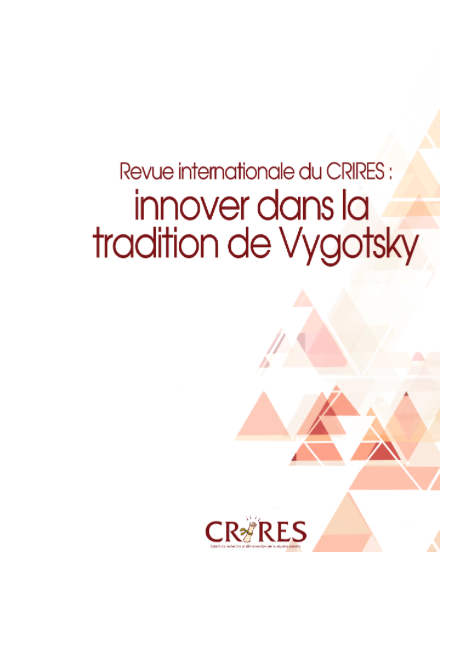La volition et l’agentivité transformatrice : perspective théorique de l’activité
DOI :
https://doi.org/10.51657/ric.v1i1.41017Mots-clés :
Agentivité, Volition, Laboratoire du changement, Bibliothèque, Stimulation dualeRésumé
Cet article traite de la formation de l’agentivité transformatrice au sein d’organisations, sous l’angle de la volonté et de l’action volontaire de la théorie de Vygotsky et du principe dialectique du mouvement ascendant de l’abstrait au concret comme point de départ. Le principe de la double stimulation de Vygotsky offre un cadre dans lequel les limites des conceptualisations de l’agentivité peuvent être outrepassées. Pour illustrer et examiner plus en détail une approche différente de l’agentivité, cet article discute d’une intervention de type laboratoire du changement menée dans une bibliothèque universitaire. L’analyse dépeint l’agentivité transformatrice comme étant une volonté collective d’engagement dans la résolution de conflits critiques avec l’aide d’artéfacts culturels comme médiateurs, caractérisant ainsi le second stimulus de Vygotsky. Dans le cas analysé, le second stimulus a été élaboré et mis en œuvre comme une abstraction théorique avec un potentiel de généralisation expansive permettant de multiples applications concrètes. L’analyse indique que pour servir de second stimulus et d’abstraction initiale, les participants doivent s’approprier les artéfacts comme instrumentalité pour résoudre leurs conflits et investir dans les initiatives agentives pour transformer leurs activités.
Références
Battilana, J. et D’Aunno, T. (2009). Institutional work and the paradox of embedded agency. Dans T. B. Lawrence, R. Suddaby et B. Leca (Dir.), Institutional work : Actors and agency in institutional studies of organizations (pp. 31-58). Cambridge : Cambridge University Press.
Bruch, H. et Ghoshal, S. (2004). A bias for action : How effective managers harness their willpower, achieve results, and stop wasting time. Boston : Harvard Business School Press.
Davydov, V. V. (1990). Types of generalization in instruction : Logical and psychological problems in the structuring of school curricula. Reston : National Council of Teachers of Mathematics.
Engeström, Y. (2007). Putting Vygotsky to work: The Change Laboratory as an application of double stimulation. Dans H. Daniels, M. Cole et J. V. Wertsch (Dir.), The Cambridge companion to Vygotsky. Cambridge : Cambridge University Press.
Engeström, Y. (2008). From teams to knots : Activity-theoretical studies of collaboration and learning at work. Cambridge : Cambridge University Press.
Engeström, Y. (2011). From design experiments to formative interventions. Theory and Psychology, 21(5), 598-628.
Engeström, Y., Engeström, R. et Vähäaho, T. (1999). When the center does not hold : The importance of knotworking. Dans S. Chaiklin, M. Hedegaard et U. J. Jensen (Dir.), Activity theory and social practice : Cultural-historical approaches. Aarhus : Aarhus University Press.
Engeström, Y., Nummijoki, J. et Sannino, A. (2012). Embodied germ cell at work: Building an expansive concept of physical mobility in home care. Mind, Culture, and Activity, 19(3), 287-309.
Engeström, Y., Rantavuori, J., et Kerosuo, H. (sous presse). Expansive learning in a library : Actions, cycles and deviations from instructional intentions. Vocations and Learning, 6(1), 81-106.
Engeström, Y., Virkkunen, J., Helle, M., Pihlaja, J. et Poikela, R. (1996). Change laboratory as a tool for transforming work. Lifelong Learning in Europe, 1(2), 10-17.
Engeström, Y. et Sannino, A. (2010). Studies of expansive learning : Foundations, findings and future challenges. Educational Research Review, 5, 1-24.
Gollwitzer, P. M. et Sheeran, P. (2006). Implementation intentions and goal achievement : A meta-analysis of effects and processes. Advances in Experimental Social Psychology, 38, 69-119.
Greenstein, D. (2010). Strategies for sustaining the university library. Portal : Libraries and the Academy, 10(2), 121-125
Haapasaari, A., Engeström, Y. et Kerosuo, H. (2013). The emergence of learners' transformative agency in a Change Laboratory intervention. Manuscript soumis pour publication.
Heckhausen, H. et Gollwitzer, P. M. (1987). Thought contents and cognitive functioning in motivational versus volitional states of mind. Motivation and Emotion, 11(2), 101-120.
Il’enkov, E. V. (1982). The dialectics of the abstract and the concrete in Marx's Capital. Moscou : Progress Publishers.
Laitinen, A. (2012). Double stimulation and agency in the experiment of the “meaningless situation” (Thèse de licence). Helsinki, Université de Helsinki.
Lawrence, T. B. et Suddaby, R. (2006). Institutions and institutional work. Dans S. R. Clegg, C. Hardy, T. B. Lawrence et W. R. Nord (Dir.), Handbook of organization studies (pp. 215-254). London : Sage.
Marx K. (1976). Theses on Feuerbach. Dans K. Marx et F. Engels, Collected works. Vol.5. London : Lawrence et Wishart.
Sannino, A. (2008). From talk to action : Experiencing interlocution in developmental interventions. Mind, Culture, and Activity, 15(3), 234-257.
Sannino, A. (2011). Activity theory as an activist and interventionist theory. Theory & Psychology, 21(5), 571-597.
Seo, M. G. et Creed, W. E. D. (2002). Institutional contradictions, praxis, and institutional change : A dialectical perspective. Academy of Management Review, 27(2), 222-247.
Van der Veer, R. et Valsiner, J. (1991). Understanding Vygotsky : A quest for synthesis. Oxford, UK : Basil Blackwell.
Virkkunen, J. (2006a). Dilemmes dans la construction d'une capacité d'action partagée de transformation. Activités revue électronique, 3(1), 19-42.
Virkkunen, J. (2006b). Dilemmas in building shared transformative agency. Activités revue électronique, 3(1), 43-66.
Virkkunen J. et Newnham, D. (2013). The Change Laboratory : A tool for collaborative development of work activities. Manuscript soumis pour publication.
Vygotsky, L. S. (1987). Lectures on psychology. Dans The collected works of L. S. Vygotsky. Vol. 1. Problems of general psychology. New York : Plenum.
Vygotsky, L. S. (1997). The instrumental method in psychology. Dans The collected works of L. S. Vygotsky. Vol. 3. Problems of the theory and history of psychology. New York : Plenum.
Vygotsky, L. S. (1999). Tool and sign in the development of the child. Dans The collected works of L. S. Vygotsky. Vol. 6 : Scientific legacy. New York : Plenum.
Téléchargements
Publié
Numéro
Rubrique
Licence
© Yrjö Engeström, Annalisa Sannino 2017

Cette œuvre est sous licence Creative Commons Attribution - Pas d'Utilisation Commerciale - Pas de Modification 4.0 International.

